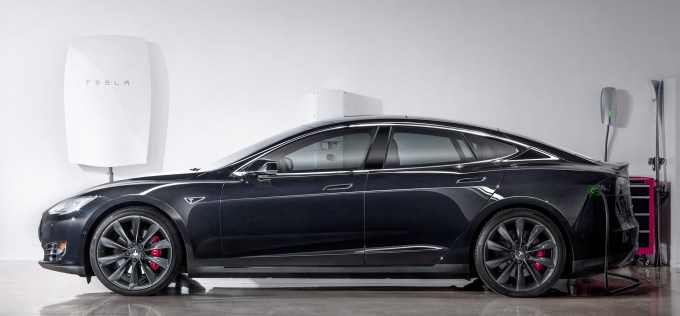 You almost certainly associate Tesla with cars — very cool cars — but the company has an even grander vision beyond that. Today, CEO and founder Elon Musk unveiled ‘Tesla Energy’ — a new business arm that is focused on ending our dependence on grid power and switching instead to solar energy.
You almost certainly associate Tesla with cars — very cool cars — but the company has an even grander vision beyond that. Today, CEO and founder Elon Musk unveiled ‘Tesla Energy’ — a new business arm that is focused on ending our dependence on grid power and switching instead to solar energy.The first Tesla Energy product is ‘Powerwall Home Battery,’ a stationary battery that can power a household without requiring the grid. The battery is rechargeable lithium-ion — it uses Tesla’s existing battery tech — and can be fixed to a wall, removing much of the existing complexity around using a local power source.
“The issue with existing batteries is that they suck,” Musk said in a press conference announcing Tesla Energy. “They are expensive, unreliable and bad in every way.”
Tesla’s solution, he said, is different.
For one thing, the company’s batteries cost $3,500 for 10kWh and $3,000 for 7kWh — add your snarky Apple Watch price comparison here. They are open for pre-orders in the U.S. now; the first orders will be dispatched “in late summer.”
Like regular batteries, they can be used together — up to nine can be stacked up together to create a strong and reliable power source. Musk said he believes they can help people in emerging markets or remote locations ‘leapfrog’ the need for existing power systems, in a similar way that mobile phones have become more important than landlines in remote parts of the world.

A Tesla car is (sadly) not included with your purchase
“This is within the power of humanity to do,” Musk said. “It is not impossible, it is something that we can do. But there’s going to [need to] be other companies involved.”
Musk added that Tesla will continue its policy of open-sourcing patents to help make that happen.
Contrary to most companies these days, Tesla’s press conference — which ran entirely on solar energy — was direct and to the point with little hyperbole.
Musk has made electric cars a (stylish) reality, and is pioneering space exploration with SpaceX. Tesla Energy is another concept which, though beyond the realm of most people’s understanding, has potentially huge consequences if Tesla can execute as Musk believes it can.